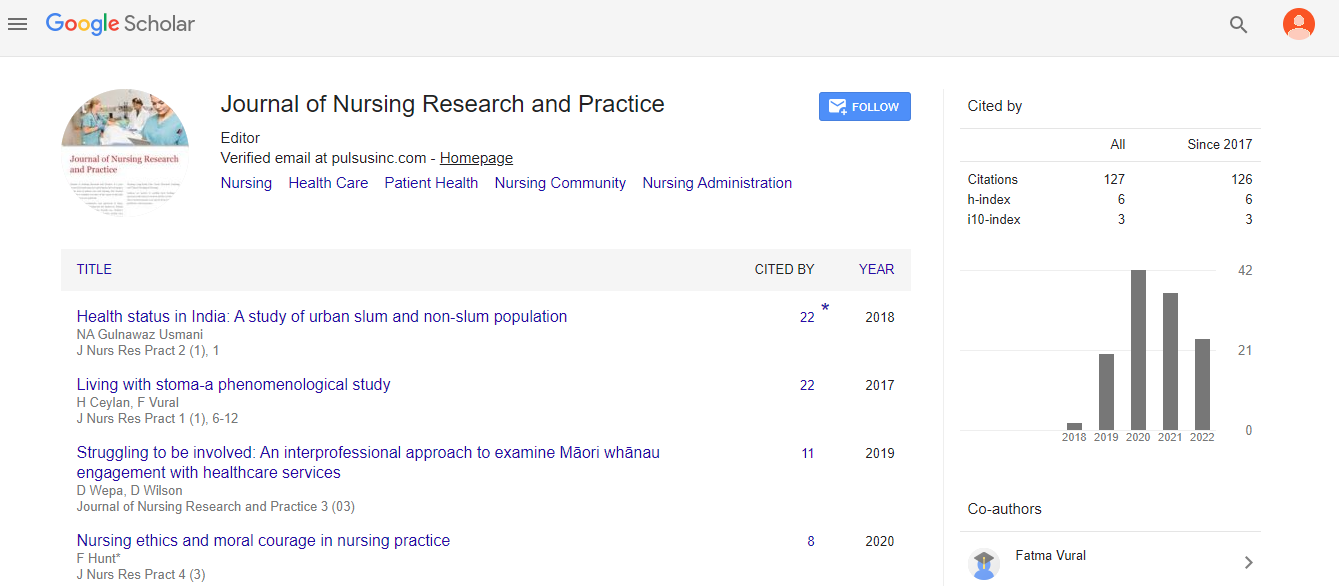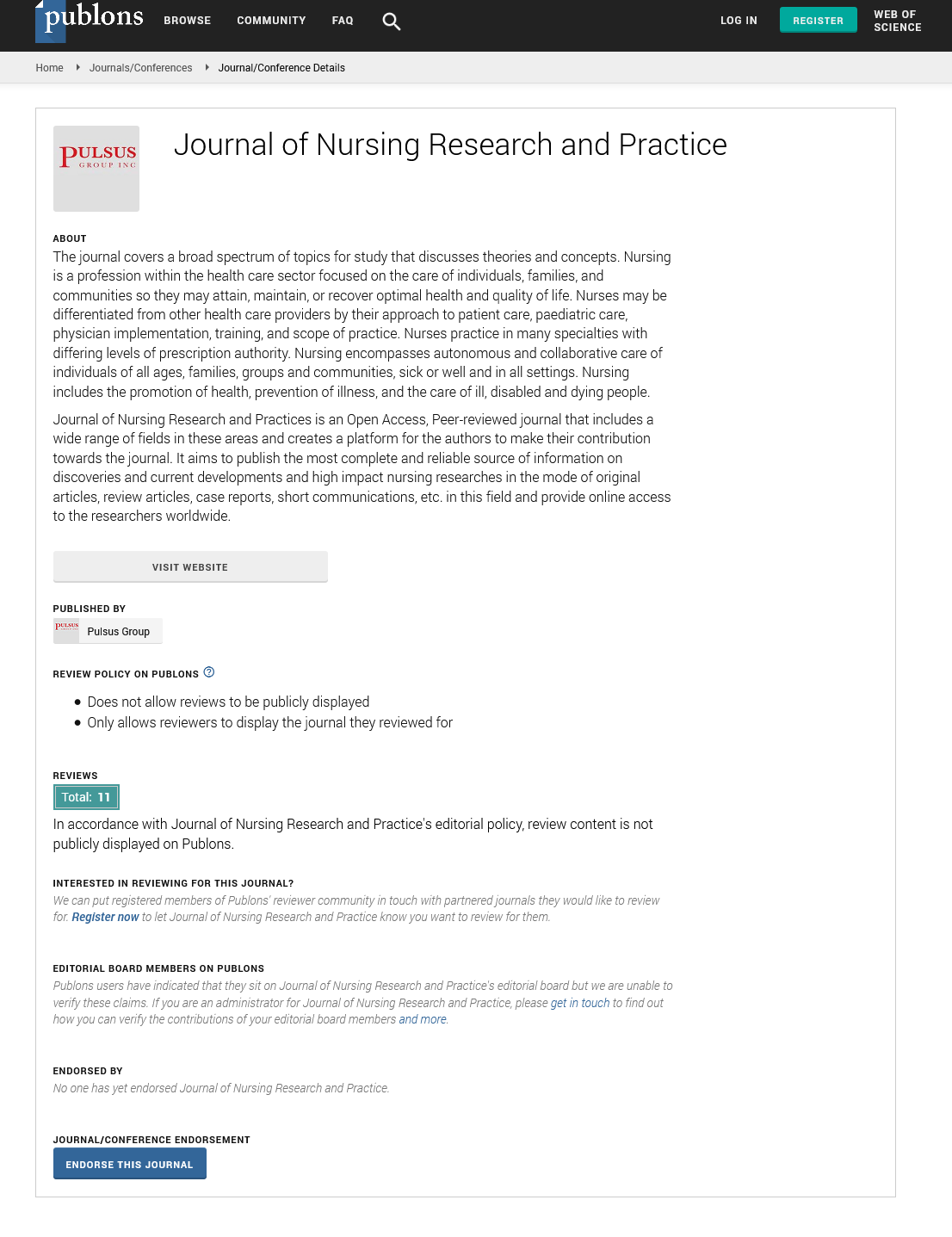The use of discussion in nursing ethics instruction
Received: 15-Jul-2022, Manuscript No. PULJNRP-22-5581; Editor assigned: 16-Jul-2022, Pre QC No. PULJNRP-22-5581(PQ); Accepted Date: Jul 27, 2022; Reviewed: 21-Jul-2022 QC No. PULJNRP-22-5581(Q); Revised: 26-Jul-2022, Manuscript No. PULJNRP-22-5581(R); Published: 29-Jul-2022, DOI: DOI: 10.37532/Puljnrp .22.6(7).124- 125.
Citation: Pathak V, The Use of Discussion in Nursing Ethics Instruction. J Nurs Res Pract. 2022; 6(7):124-125.
This open-access article is distributed under the terms of the Creative Commons Attribution Non-Commercial License (CC BY-NC) (http://creativecommons.org/licenses/by-nc/4.0/), which permits reuse, distribution and reproduction of the article, provided that the original work is properly cited and the reuse is restricted to noncommercial purposes. For commercial reuse, contact reprints@pulsus.com
Abstract
One method for teaching students about ethical concerns in nursing practice could be to use debate as a teaching method and a learning exercise. In this essay, I'll discuss how class discussions among second-year nursing undergraduate students were used in Brunei Darussalam to educate nursing ethics. Extremely good, I would want to emphasize some of my aspirations and concerns for the use of debate in the teaching of nursing ethics in the future. I will also think carefully about how the debate will be conducted overall and how the discussion topic will be presented. Although students have repeatedly indicated satisfaction with this active learning experience and feedback from the course evaluation has been.
Keywords
Online education, online nursing, and the use of technology in online learning for teaching.
INTRODUCTION
Given the quick advancements in healthcare, growing ethical concerns, and complicated demands placed on nurses, nurses are required to practice ethics. This means that nurses must address ethical issues and reach ethical conclusions. Additionally, undergraduate courses should have a strong emphasis on ethics education to help nursing students become aware of ethical issues, form moral judgments, and act morally. But moral education cannot be imparted through rote learning and mechanical comprehension. Instead, it entails developing vital and varied skills to encourage genuine reflection in actual circumstances. One method for teaching students about ethical concerns in nursing practice could be to use debate as a teaching method and a learning exercise. The use of debate in instruction has been practiced for many centuries. Before a decision is made, opposing viewpoints or potential solutions are discussed in an organized manner. It is a kind of teaching that encourages clinical reasoning, critical thinking, and awareness of one's attitudes, values, and beliefs. Students can expand their understanding of social issues through debate, explore diverse points of view, and recognize that people will have different opinions on any given subject. Notably, the students need to understand all of the evidence and not just one side of an argument.
The Debate Topic
The pre-assigned subjects, which are typically appropriate, topical, and arguable, are the first item taken into account in the debate design. This means that the issues must be distinct and impartial toward both sides of the debate. In other words, nurses' moral, professional, and legal obligations, such as informed consent and patient responsibility, must be attempted to in order to guarantee that the themes represent the cultural sensitivity of the nation. It is also essential.
Implementation of Debate
The fact that the debate is a student-led activity in which a team leader is chosen is made clear to the students right away. In other words, students are treated as adult learners and given the opportunity to explore and talk about the debate issue. During the debate, the students are assigned various roles, including debaters, judges, and audience members. Students are given a "position" to take during debates in order to remove any ambiguity surrounding "fluid" subjects
Expectations and Worries about the Future
Since I've been using debates as a teaching tool for nearly five years, I've discovered that nursing students in general find debates to be enjoyable learning experiences. It is hoped that this type of activity will continue and can support both conventional and cutting-edge learning approaches. There is no denying, however, that in order for debates to be successful, teaching teams must consider a number of different elements. As educators, we must remain impartial and adaptable during the debating process and refrain from having preconceived notions.
CONCLUSION
To develop students' critical thinking skills early on, debate is introduced as a teaching approach. Making a discussion a student-led 125 J Nurs Res Pract Vol 6 No 7 July 2022 Pathak exercise gives the kids a sense of ownership over their learning and prevents them from just taking in knowledge. It should be highlighted, too, that despite the debate appearing to be an exciting chance for students to consider ethical issues, the exercise is actually very taxing on both the students and the professors.






